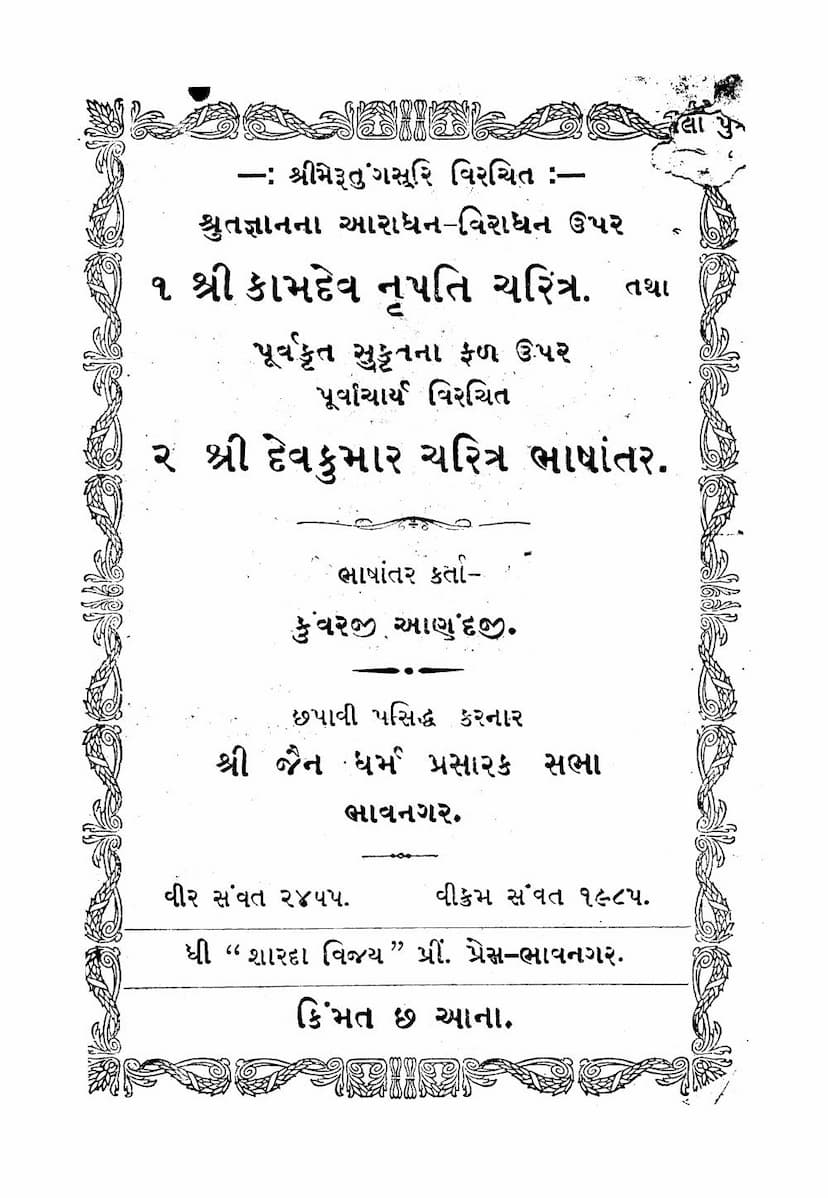Kamdev Nrupati Tatha Devkumar Charitra
Added to library: September 2, 2025

Summary
The book "Kamdev Nrupati Tatha Devkumar Charitra" (The Lives of King Kamdev and Devkumar) by Kunvarji Anandji, published by Shri Jain Dharm Prasarak Sabha, Bhavnagar, in Veer Samvat 2455 / Vikram Samvat 1985, is a collection of two Jain narrative texts.
Part 1: Shri Kamdev Nrupati Charitra (The Life of King Kamdev)
This section translates a Sanskrit prose work by Shri Merutung Suri, originally composed in 1467 (likely referring to a date in the past, as the publication date is much later). The story is highlighted as being valuable for understanding the benefits and detriments related to the adoration and neglect of Shrut Gyan (scriptural knowledge).
Key points of King Kamdev's story include:
- The Struggle for a Son: King Kamdev's father, unable to have a child, seeks the intervention of a Kevali (omniscient being). The Kevali reveals Kamdev's past life where a single repeated sentence led to an obstruction in having a son.
- Remedies and Mantras: The Kevali prescribes specific austerities to overcome the karmic obstruction. A divine being inquires about the King's father's past life, leading to the revelation of the profound significance of the Namaskar Mahamantra, with a specific verse recommended for chanting.
- Overcoming Obstacles: Kamdev's adherence to these practices leads to the removal of the karmic obstruction and the birth of a son.
- Philosophical Debates: The narrative includes a noteworthy dialogue between Saubhagyamanjari and a scholar on the prominence of prosperity versus Saraswati (knowledge).
- Challenges and Wisdom: Saubhagyamanjari faces an insult from a heretical female ascetic, who then attempts deception. In a Swayamvar (self-choice ceremony), Saubhagyamanjari poses challenging questions about fundamental philosophical concepts (e.g., "Day first or night first? Seed first or sprout first? Effort or karma – who is stronger?"). While she answers the third question, the first two are designed to stump those who don't believe in an eternal origin of the universe. The story implies that Saubhagyamanjari's initial counter-argument, which the kings couldn't answer, might have pertained to the nature of the Three Jewels (Right Faith, Right Knowledge, Right Conduct).
- Understanding Karma and Conduct: Kamdev encounters a Kevali on his journey who explains the nature of eight types of karma and the harm caused by transgressing the eight principles of Gyanachara (conduct related to knowledge) through various examples.
- Past Life Insights: The narrative delves into Kamdev's past life, detailing his practice and neglect of knowledge.
The introduction emphasizes the importance of respecting and caring for religious books as they are the source of knowledge, which is paramount for both worldly and spiritual happiness.
Part 2: Shri Devkumar Charitra (The Life of Devkumar)
This section recounts a story about the fruits of good deeds performed in past lives. The author of the original work is not specified, but the story emphasizes how past merits lead to prosperity, spiritual insight, and good fortune.
Key aspects of Devkumar's story include:
- The Desire for a Son: The story begins with King Sur, a righteous ruler, and his queen, Mahalakshmi, who are blessed with wealth and happiness but yearn for a child. Despite their efforts, they remain childless, leading to Mahalakshmi's deep sorrow.
- Misguided Efforts: The queen, heartbroken by her inability to have a child, observes a hen nurturing its chicks and feels immense grief. She confides her sorrow to her maid, who advises her not to trouble the King with her sadness. The King, noticing her distress, consults an astrologer who suggests appeasing the Sun deity. The King spends considerable wealth on rituals, but they prove ineffective.
- The Power of Devotion: Eventually, the King decides to worship the goddess Kamadudha. He performs severe austerities, fasting for a month. The goddess appears and grants him a boon, but with a caveat: the son born would be the cause of his demise. The King, despite this warning, accepts the boon out of desperation.
- The Birth of Devkumar: The Queen conceives and gives birth to a son, Devkumar, who is exceptionally beautiful and intelligent. The King is overjoyed.
- Devkumar's Downfall: As Devkumar grows, he becomes engrossed in worldly pleasures, neglecting his studies and his family responsibilities. He falls prey to bad company and develops a fascination for a beautiful statue. He spends his days in the company of courtesans and neglects his father's business.
- The Consequences of Bad Company: Devkumar's association with courtesans leads to a decline in his fortune. His mother, Mahalakshmi, expresses her sorrow to him, but he is too engrossed in his pleasures to pay heed.
- The Role of Karma: The story highlights the impact of past karma. Devkumar's predicament is attributed to his past life's actions. The tale of Kalisut and Parshuram is used as a significant illustration.
- Kalisut and Parshuram: This narrative within the narrative illustrates the consequences of greed and attachment. Kalisut, a servant, steals a royal ornament. Parshuram, a wise minister's son, expertly recovers it through his intelligence and moral uprightness. This section emphasizes the importance of honesty and the detrimental effects of greed.
- The King's Demise and Devkumar's Reckoning: Devkumar's father, the King, dies. Devkumar, realizing his folly, is consumed by grief and guilt. He attempts to perform his father's last rites, showcasing his newfound remorse.
- Devkumar's Repentance and Path to Salvation: Devkumar, disillusioned with worldly pleasures, seeks guidance from a Jain monk. He embarks on a path of repentance, performs austerities, and eventually attains spiritual liberation, becoming a divine being.
The publication also includes a note stating that 500 copies of this book were printed with the assistance of two householders and are being gifted to the annual members of the Shri Jain Dharm Prasarak Sabha. The book is available for sale at six annas. The Sabha expresses gratitude to the President, Kunvarji Anandji, for his translation efforts and to the mother of Shri Parmanand for sponsoring 500 copies for donation.